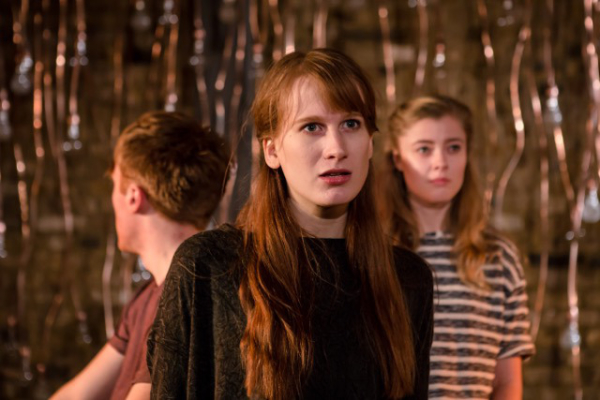
© Richard Davenport
At its simplest, Abyss is a crime thriller – but imagine The Killing as written by Martin Crimp. It’s every bit as compelling as that might suggest, but German-born playwright Maria Milisavljevic, who won the prestigious Kleist award for young dramatists with the play, uses a more poetic, theatrical form to tease out the political and philosophical dimensions of one particular case.
A 24 year-old woman, Karla Richter, has gone missing. She nipped out to the shops and never came back. As the days pass, and neither the police nor the papers show more than a passing interest, her three flatmates take up the search themselves.
One of them, an unnamed woman (Nicola Kavanagh), narrates that trail; how Karla’s boyfriend Vlado (Iain Batchelor), a Serb-Croat immigrant jumbled by the conflict of his childhood, turns vigilante detective, diving into the dark heart of the city. Gradually you realise that she’s enjoying this. It’s exciting; Vlado’s exciting – certainly more than her own gentle, dimpled computer programmer boyfriend Jan. Does she even want to find Karla? Can we trust her version of events? Her younger sister Sofia (Jennifer English) – Karla’s roomie – is less convinced by it all, but her sensible, considerate course of action gets diminished in the telling.
In all of this, then, there’s the lick of existential angst. How easy it is to disappear – to fall off the face of the planet or to blend into the crowd. For all her distinguishing features, Karla’s just another missing person – as any of us could be – possibly, just another dead body. To the papers, a party girl. No more. No less.
That anonymity – the meaninglessness of it all – is the basis of the abyss, and Milisavljevic finds it everywhere: in the city, in nature, in death, even in sex. It all conflicts with the sense that we’re the heroes of our own life-story. Vlado and the narrator have been on-off lovers for a long time, apparently unable to commit or to let one another go. It’s like each only exists in the other’s eyes and arms.
Most of all, though, Milisavljevic finds it in the immigrant experience. The police don’t seem to care about Karla – at least, not until they start to care about Vlado, suspicious simply for being Serbo-Croatian. The Russian quarter, such a shock to our guide, seems like a black hole in the middle of the city. She’d never even considered its existence before.
It’s a beautiful piece of writing, with lines like lapping waves and occasional breaks into roaring poetry. Anna Morrissey’s expressive, low-key movement has actors dangling off monkey bars and vaulting over tables, and allows director Jacqui Honess-Martin to extract the rhythms and feelings beneath the text beautifully. There’s a real attention to tone, which breaks the play up well and mitigates against its swirling poetry, even if it can’t entirely prevent confusion creeping in at the end.
Abyss runs at the Arcola Theatre until 25 April












